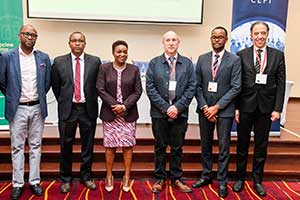Health CS Susan Nakhumicha has emphasised the urgent need to invest in local pharmaceutical manufacturing, with a particular emphasis on raw materials and ingredients that are in short supply.
This comes as representatives from various African countries gather in Nairobi to strategize about strengthening vaccine manufacturing supply chains across the continent.
The Africa Vaccine Supply Manufacturing Forum aims to strengthen vaccine manufacturing supply chains in Africa, which is critical for future outbreaks and equitable vaccine access.
Speaking at the three-day forum’s official opening, Nakhumicha acknowledged that Africa as a continent has faced a number of outbreaks, including Ebola, as well as regular threats from other Africa-specific diseases such as Lassa fever and Rift Valley fever.
She also stated that the COVID-19 pandemic demonstrated the risk to the African continent, emphasising the importance of investing in local pharmaceutical manufacturing.
Nakhumicha stated that, despite progress in Kenya’s pharmaceuticals industry, such as increased local access to certain products and lower prices for locally produced medical products, there are still challenges that must be addressed.
“These include complexity in the transparency of trade regulations linked to the import and trade of input materials and finished products,” Nakhumicha stated.
Other challenges she identified include a skills gap in the workforce, a lack of technology transfer from international manufacturers and a lack of expertise and know-how required for product market authorization, quality control and site inspection to meet international standards.
“Raw materials and equipment are not locally manufactured and readily available. High cost of capital and lack of capital investment in support of pharmaceutical manufacturing also need to be addressed,” she exclaimed.
In April 2021, the African Union (AU) member states launched the Partnerships for African Vaccine Manufacturing (PAVM) in collaboration with the Africa CDC.
The goal is to support the continent’s vaccine manufacturing efforts.
The goal is to develop, produce and deliver more than 60% of the vaccine doses required across the continent by 2040, up from less than 1% at the time.
Since then, the Africa CDC has pursued this agenda in close collaboration with ecosystem stakeholders.
Kenya’s growing pharmaceutical manufacturing sector is regarded as a critical component in the development of a progressive and sustainable healthcare system capable of meeting both routine and emergency needs.
The CS has now stated that in order for AU member states to meet the ambitious goal of manufacturing 60% of continental vaccine demand by 2040, they must reduce their current reliance on imported Active Pharmaceutical Ingredients.
She has stated that they should reduce dependence to 50% and increase local capacity to produce such input materials.
“Instead of only focusing on producing the final medical products, we need to begin investing into securing the required input materials, localizing production where feasible and possible,” Nakhumicha noted.
They should also increase the proportion of pharmaceutical manufacturers that adhere to national good manufacturing practice standards from 65 percent to 100 percent.
She also stated that supporting local manufacturers who fully comply with global standards for good manufacturing practices is critical for the continent.

